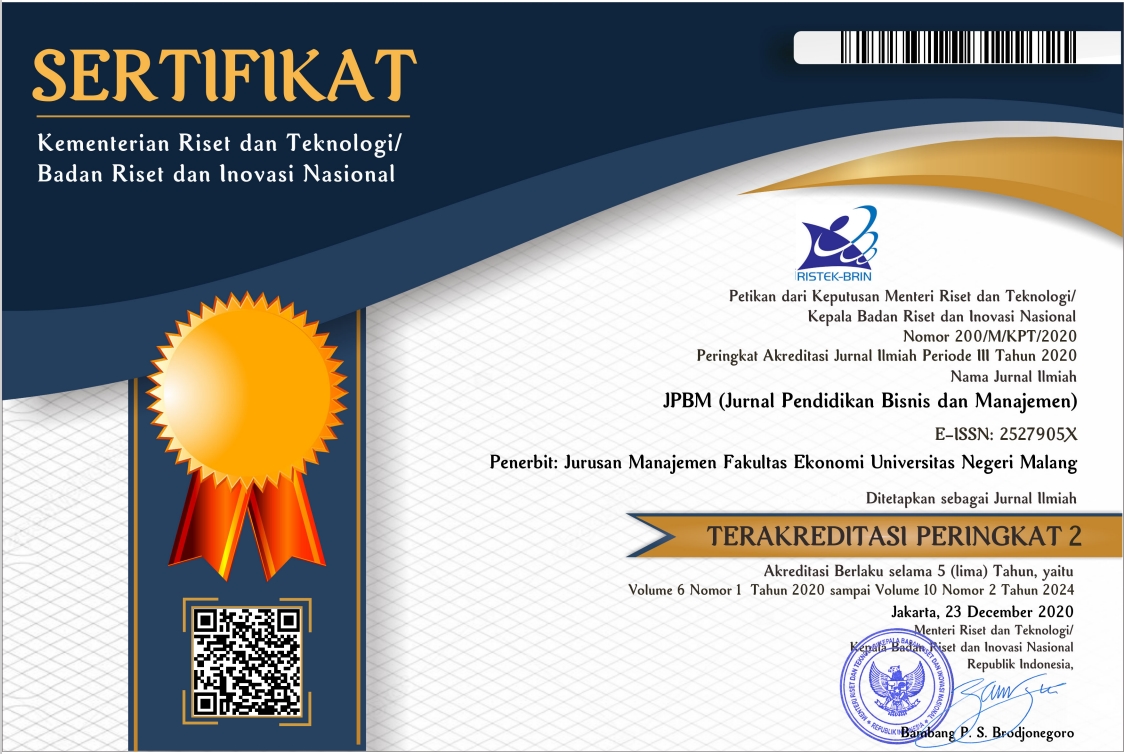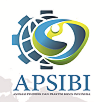Do Technology Utilization and Lecturer Competence Matter for Online Learning? The Mediating Role of Independent Learning
Abstract
This study examines the effect of technology utilization and lecturer competence on the effectiveness of online learning with independent learning as a mediating variable. The population in this study were students of Economics Education Department, Universitas Negeri Semarang in class of 2018. The sampling technique involved in this study is a saturated which consisting of 120 students. The data further analyzed using descriptive statistical and path analysis. The results showed that technology utilization had no effect on the effectiveness of online learning for computer courses. Lecturer competence and learning independence had a positive and significant effect on the effectiveness of online learning for computer courses. The technology utilization had no effect on learning independence, while lecturer competence positively impacts on learning independence. Additionally, independent learning failed in mediating the effect of technology utilization but it can mediate the effect of lecturer competence on the effectiveness of online learning. From these findings, lecturers should provide more interesting learning materials so that the effectiveness of online learning increases and can foster independent learning in students.
Keywords: Effectiveness of online learning, Learning independence, Lecturer competence, Technology utilization
Keywords
Full Text:
PDFReferences
Arif, A. R. H., & Naufal, M. D. (2020). Praktikum dalam Jaringan? Boulevarditb. https://boulevarditb.com/2020/09/19/praktikum-dalam-jaringan/
Aziz, A., & Basry, B. (2017). Hubungan antara kompetensi guru dan kepercayaan diri dengan kemandirian siswa SMPN 2 Pangkalan Susu. Jurnal Psychomutiara, 1(1), 15–29.
Cai, R., Wang, Q., Xu, J., & Zhou, L. (2020). Effectiveness of students’ self -regulated learning during the COVID-19 pandemic. Sci Insigt, 34(1), 175–182. https://doi.org/10.15354/si.20.ar011.Author
Carter, R. A., & Rice, M. (2020). Self-regulated learning in online learning environments : strategies for remote learning. Information and Learning Sciences, 121(5), 321–329. https://doi.org/10.1108/ILS-04-2020-0114
Febriastuti, Y. D., Linuwih, S., & Hartono. (2013). Peningkatan Kemandirian belajar siswa SMP Negeri 2 Geyer melalui pembelajaran inkuiri berbasis proyek. Unnes Physics Education Journal, 2(1), 27–33. https://doi.org/10.15294/upej.v2i1.1617
Fitria, T. N. (2021). Lecturer’s pedagogic competence : Teaching English in online learning during pandemic Covid-19. Journal of English Education, 6(2), 100–108. https://doi.org/10.31327/jee.v6i2.1569
Hermawati, L. I., & Andayani, E. (2020). Kompetensi pedagogik guru, model discovery learning, dan gaya belajar terhadap kemandirian belajar. Jurnal Penelitian Dan Pendidikan IPS (JPPI), 14(1), 22–30. https://doi.org/https://doi.org/10.21067/jppi.v14i1.4761
Hikmat, Hermawan, E., Aldim, & Irwandi. (2020). Efektivitas Pembalajaran daring selama masa pandemi Covid-19: Sebuah survey online. Digital Library, UIN Sunan Gunung Djati, Bandung, 1–7. http://digilib.uinsgd.ac.id/30625/
Hollweck, T., & Doucet, A. (2020). Pracademics in the pandemic : Pedagogies and professionalism the pandemic. Journal of Professional Capital and Community, 5(3), 295–305. https://doi.org/10.1108/JPCC-06-2020-0038
Innayah, R. (2020). Pengaruh media pembelajaran online, motivasi belajar, dan kompetensi dosen terhadap kualitas pembelajaran. Composites Part A: Applied Science and Manufacturing, 8(2), 38–47. https://doi.org/http://dx.doi.org/10.24127/pro.v8i2.3308
Karlen, Y., Hertel, S., & Hirt, C. N. (2020). Teachers’ Professional competences in self-regulated learning: An approach to integrate teachers’ competences as self-regulated learners and as agents of self-regulated learning in a holistic manner. Frontiers in Education, 5(159), 1–20. https://doi.org/10.3389/feduc.2020.00159
Koroh, T. (2020). Respons mahasiswa terhadap pembelajaran daring dan kemandirian belajar mahasiswa selama pandemi Covid-19. Widyadewata : Jurnal Balai Diklat Keagamaan Denpasar, 3, 54–59.
Lestari, S. (2018). Peran teknologi dalam pendidikan di era globalisasi. Jurnal Pendidikan Agama Islam, 2(2), 94–100. https://doi.org/https://doi.org/10.33650/edureligia.v2i2.459
Maulana, H. A., & Hamidi, M. (2020). Persepsi mahasiswa terhadap pembelajaran daring pada mata kuliah praktik di pendidikan vokasi. Jurnal Pendidikan, 8(2), 224–231. https://doi.org/10.26618/equilibrium.v8i2.3443
Mitasari, Z., Istikomayanti, Y., & Setiawan, R. (2020). Pembelajaran daring di Perguruan Tinggi : Persepsi dan faktor penentu. Bioedukasi, 12(1), 84–91.
Murti, R. W., & Prasetio, A. P. (2018). Pengaruh kompetensi dosen terhadap prestasi akademik mahasiswa Fakultas Ekonomi dan Bisnis Telkom University. Jurnal Penelitian Pendidikan, 18(2), 94–102. https://doi.org/10.17509/jpp.v18i2.12950
Nurgiansah, T. H. (2021). Efektivitas pembelajaran daring di masa pandemi COVID-19 bagi mahasiswa Universitas PGRI Yogyakarta. Jurnal Basicedu, 5(1), 367–375. https://doi.org/https://doi.org/10.31004/basicedu.v5i1.669
Pakpahan, R., & Fitriani, Y. (2020). Analisa pemafaatan teknologi informasi dalam pembelajaran jarak jauh di tengah pandemi virus corona Covid-19. JISAMAR (Journal of Information System, Applied, Management, Accounting and Researh), 4(2), 30–36.
Pangondian, R. A., Insap Santosa, P., & Nugroho, E. (2019). Faktor - faktor yang mempengaruhi kesuksesan pembelajaran daring dalam revolusi industri 4.0. In Seminar Nasional Teknologi Komputer & Sains (SAINTEKS) 2019. https://seminar-id.com/semnas-sainteks2019.html
Rahmanita, F. (2020). Analisis pengaruh teknologi informasi dan komunikasi pada kemandirian belajar siswa pada masa pandemi Covid-19. Jurnal Pendidikan, Hukum, Dan Bisnis, 5(1), 69–77. https://doi.org/http://dx.doi.org/10.32493/eduka.v5i1.8167
Ratnasari, E. D., Saputra, N., & Rahmana, F. (2021). The effect of online learning technology on learning effectiveness. In Proceedings of 2021 International Conference on Information Management and Technology, ICIMTech 2021, 702–705. https://doi.org/10.1109/ICIMTech53080.2021.9535093
Sani, R. A. (2013). Inovasi pelajaran. Jakarta : Bumi Aksara.
Sari, L. O. (2021). Pengaruh pembelajaran daring menggunakan media whatsapp di tengah wabah virus Covid-19 terhadap kemandirian belajar siswa sekolah dasar Negeri Jombor Ceper Klaten Tahun Pelajaran 2020/2021. SKRIPSI. Klaten: Universitas Widya Dharma Klaten
Sudrajat, J. (2020). Kompetensi guru di masa pandemi Covid-19. Jurnal Riset Ekonomi dan Bisnis, 13(1), 100–110. https://doi.org/http://dx.doi.org/10.26623/jreb.v13i2.2434
Sun, A., & Chen, X. (2016). Online education and its effective practice: A research review. Journal of Information Technology Education: Research, 15, 157–190. https://doi.org/10.28945/3502
Sutisna, D., & Widodo, A. (2020). Peran kompetensi guru sekolah dasar dalam meningkatkan efektivitas pembelajaran daring. Jurnal Bahana Manajemen Pendidikan, 9(2), 58–64. https://doi.org/https://doi.org/10.24036/jbmp.v9i2.110927
Syah, M. (2008). Psikologi pendidikan dengan pendekatan baru (A. S. Wardani (ed.)). Bandung : PT. Remaja Rosdakarya.
Usman, M. U. (2013). Menjadi guru profesional. Bandung : PT. Remaja Rosdakarya.
Utari. (2013). Efektivitas Layanan information and communication technology (ict) dalam proses pembelajaran di SMK 2 Sewon. Skripsi. Yogyakarta: Universitas Negeri Yogyakarta
Wang, C. H., Shannon, D. M., & Ross, M. E. (2013). Students’ characteristics, self-regulated learning, technology self-efficacy, and course outcomes in online learning. Distance Education, 34(3), 302–323. https://doi.org/10.1080/01587919.2013.835779
Widayati, I., Hakim, L., & Wahjudi, E. (2020). Keefektifan penggunaan modul praktikum untuk mata kuliah Komputer Akuntansi. Pekobis : Jurnal Pendidikan, Ekonomi dan Bisnis, 5(2), 108–116. https://doi.org/http://dx.doi.org/10.32493/pekobis.v5i2.P108-116.9879
Zhang, W., Wang, Y., Yang, L., & Wang, C. (2020). Suspending classes without stopping learning: China’s education emergency management policy in the COVID-19 outbreak. Journal of Risk and Financial Management, 13(3), 55. https://doi.org/10.3390/jrfm13030055
Zia, A. (2020). Exploring factors influencing online classes due to social distancing in COVID-19 pandemic: A business students perspective. International Journal of Information and Learning Technology, 37(4), 197–211. https://doi.org/10.1108/IJILT-05-2020-0089
Refbacks
- There are currently no refbacks.
JPBM (Jurnal Pendidikan dan Bisnis Manajemen) is licensed under a Creative Commons Attribution-NonCommercial-ShareAlike 4.0 International License.
JPBM (Jurnal Pendidikan dan Bisnis Manajemen) is abstracted and indexed in :
















